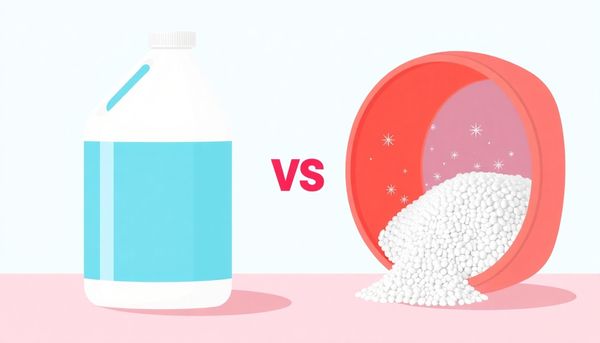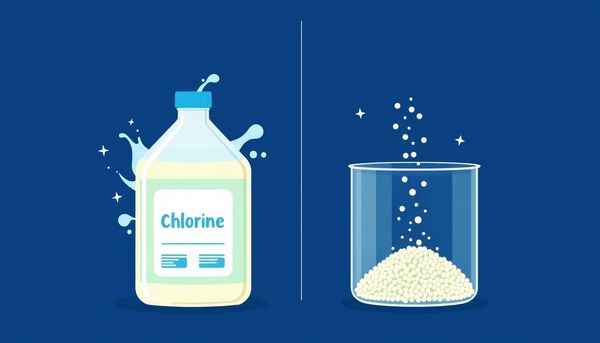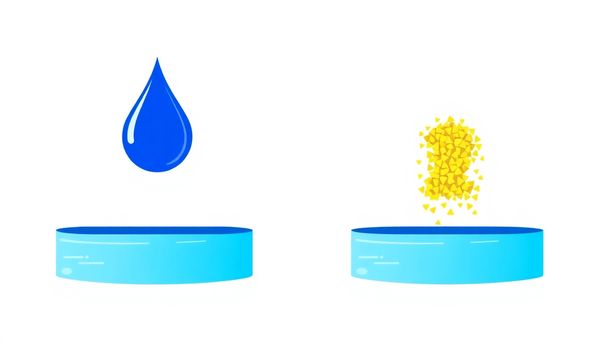Liquid vs. Granular Chlorine: Best Choice for Pool Maintenance
November 18th, 2024
November 18th, 2024
When the sun casts its warm glow over your backyard pool, inviting you for a refreshing dip, the last thing on your mind might be the chemistry behind that pristine water. Yet, for anyone who’s ever maintained a pool, the choice between liquid chlorine and chlorine granules is more than just a technical detail—it’s a decision that affects clarity, convenience, and cost. Both forms of chlorine are popular for keeping swimming pools sparkling and safe, but they come with distinct characteristics and practical considerations.
In my own experience, the debate between these two options is akin to choosing between a trusty old paperback and a sleek e-reader. Each has its merits and challenges, often swaying the decision based on personal preference or specific needs. Liquid chlorine, known for its ease of use, swiftly dissolves, making it a handy choice for immediate pool maintenance. On the other hand, chlorine granules offer a longer shelf life and are less bulky to store, appealing to those who plan their pool care with precision.
Considering the type of pool, weather conditions, and even storage space can influence which option suits your circumstances best. As you delve deeper into this comparison, understanding the nuances of each type will empower you to maintain that perfect swim-ready sanctuary right in your backyard. Whether you lean towards the liquid or the granular side, knowing the differences is your first step in making an informed decision.

Selecting the ideal chlorine for your pool is much like choosing the perfect pair of shoes; it all hinges on your specific needs and preferences. If you're managing a bustling aquatic center or a backyard oasis, the decision between liquid chlorine and chlorine granules will dictate your maintenance routine and budget. Each form of chlorine carries its own set of attributes, much like how a sandal differs from a boot—not better or worse, just different.
Liquid chlorine is akin to the no-frills sneaker of pool maintenance. It’s straightforward—just pour and go. This makes it a favorite for commercial pools that demand large-scale, efficient sanitation. However, its high pH level requires additional acid to keep your pool balanced, potentially increasing the overall cost of maintenance. Its corrosive nature also means you should handle it with care to avoid damage to your pool surfaces.
On the other hand, chlorine granules offer versatility and ease, much like a reliable pair of walking shoes. With a lower pH, they minimize the need for acid adjustment, making them a practical choice for residential pools. You can choose between dichlor, with its rapid dissolving properties, and cal hypo, known for its cost-effectiveness but requiring caution due to its fumes.
Ultimately, the right type of chlorine is the one that aligns with your pool's requirements and your lifestyle. Whether you're splashing around in a bustling community pool or a quiet backyard retreat, either form will serve you well, provided you handle them with the care and respect they require.
Choosing between liquid chlorine and chlorine granules for your pool can feel like deciding whether to bring along a beach ball or a noodle for a swim—both have their place, yet serve slightly different purposes. Liquid chlorine jumps into action with its high pH level, making it a staple for large, bustling pools. When I managed a community swimming pool, we favored liquid chlorine to handle the heavy foot traffic. It pours right in, needing minimal fuss, but be warned: its high pH requires a dance with acids to keep your water balanced. Plus, there’s the notorious corrosive nature of liquid forms, which means you’ll want to keep a close eye on pool surfaces and equipment.
Switch gears to chlorine granules, a perennial favorite among homeowners. Granules are slightly more expensive, but they bring ease of use and a friendlier pH to the table. With options like dichlor and cal hypo, you have the flexibility to address specific needs—whether it’s a quick shock treatment or regular maintenance. My neighbor swears by dichlor for her backyard pool, appreciating its fast-dissolving action and reduced need for additional chemical balancing.
Ultimately, whether you lean toward the bulk efficiency of liquid chlorine or the versatile nature of granules, your choice hinges on the size of your pool and your budget. Both serve the main purpose: to ensure your pool stays a welcoming, clear oasis.
Deciding between liquid chlorine and chlorine granules involves weighing both cost and efficiency, much like selecting between comfort and speed in a beloved car. Liquid chlorine often catches the eye with its initial lower price tag, particularly appealing for those managing large commercial pools. The prospect of handling a 55-gallon drum might seem daunting, but for a bustling aquatic center, it's a practical solution that keeps costs in check. However, the hidden expenditure lies in the need for additional acid to balance its high pH, a consideration that can tilt the scales against its perceived affordability.
On the other hand, chlorine granules, though slightly pricier upfront, offer a more balanced approach for residential pool owners. These granules, especially when selecting a type like dichlor with its low pH, can streamline pool maintenance by requiring less acid to maintain water balance. This might mean fewer trips to the pool supply store and less hassle in managing water chemistry, leaving more time to enjoy the refreshing plunge on a hot day.
Reflect on your pool's needs and your willingness to manage chemical balancing. Are you ready to handle the upfront rigors of liquid chlorine, or do you prefer the ease and balance of granules? Your choice should harmonize with both your pool's demands and your personal comfort with maintenance routines.
Understanding chlorine’s vital role in maintaining pool health is akin to appreciating a silent guardian tirelessly at work. Every time you take a refreshing dip, chlorine is busy behind the scenes, defending your pool against unwanted invaders like bacteria and algae. This chemical superhero operates through a fascinating process of breaking down the cell walls of these pesky microorganisms, effectively neutralizing them before they can multiply and disrupt your aquatic enjoyment.
The magic of chlorine lies in its ability to sanitize and oxidize simultaneously, breaking down contaminants and leaving your pool pristine. However, this potent action does not last indefinitely. As chlorine works its magic, it gradually diminishes, necessitating regular replenishment to maintain its efficacy. This ongoing cycle is why pool owners must routinely add chlorine, ensuring water remains safe and clear.
Choosing between liquid chlorine and granules can feel like deciding between two trusty sidekicks, each bringing their strengths to the table. Liquid chlorine, often favored for commercial or high-traffic pools, provides an easy application—just pour and go. Meanwhile, chlorine granules, particularly popular among residential pool owners, offer a lower pH alternative requiring less acid adjustment. The decision hinges on factors such as pool size, frequency of use, and maintenance budget. Regardless of choice, understanding chlorine's critical function empowers you to make informed decisions, keeping your pool a safe haven for fun and relaxation.

Choosing between liquid chlorine and chlorine granules for your pool can feel a bit like picking between a classic novel and its movie adaptation—each has its unique strengths and potential drawbacks. Liquid chlorine, often seen as the workhorse of the pool world, is ideal for those with large, bustling pools where chlorine needs to be added in bulk. It flows directly into the water with minimal effort, making it a convenient choice. However, its high pH level means you’ll need to keep a close eye on your pool’s chemical balance, adding more acid to counteract potential imbalances. Plus, due to its corrosiveness, extra care is needed in handling to protect your pool surfaces.
On the other hand, chlorine granules offer a different set of advantages. Their lower pH level means less fuss with additional chemicals, and they dissolve quickly, making them a favorite for private pool owners. Granules come in two varieties—dichlor and cal hypo—each tailored to specific needs. Dichlor, with its rapid dissolution and immediate action, is perfect for quick fixes, while cal hypo is celebrated for its cost-effectiveness despite its instability.
Ultimately, your choice should align with your pool’s size, usage, and your budget. Just like a great story, both forms of chlorine will keep your pool crystal clear and inviting, allowing you to enjoy countless splash-filled memories.
Selecting between liquid chlorine and chlorine granules can feel like choosing between two trusted companions, each with its own unique strengths. If you've ever swum in a friend's pool and noticed their water was as clear as a mountain spring, chances are they've mastered the art of choosing the right chlorine.
Liquid chlorine is straightforward—imagine a quick splash that swiftly disperses through the water. Its high pH can be a double-edged sword: while it's great for neutralizing other acidic elements in the pool, it demands an additional supply of acid to maintain balance. It's the go-to for large pools, particularly in commercial settings, where ease of use and the ability to add in bulk are major pluses. However, its corrosive nature requires careful handling to prevent damage to pool surfaces.
On the other hand, granules are akin to a slow-release remedy. They come with a slightly higher upfront cost but bring the advantage of a lower pH, reducing the need for extra balancing chemicals. Options like dichlor and cal hypo offer flexibility—dichlor dissolves quickly and stabilizes with cyanuric acid, while cal hypo is a potent, though less stable, shock treatment.
Ultimately, the choice hinges on your pool's needs and your maintenance style. Whether you opt for the efficient liquid or the dependable granules, both will ensure your pool remains inviting. Just remember, whichever path you choose, handling with care is key to a sparkling, safe swimming haven.
When weighing the costs and efficiency of liquid chlorine versus chlorine granules, many factors come into play. Liquid chlorine, often favored for its lower upfront cost, can initially seem like a budget-friendly choice. Its ease of use—simply pouring it into the pool—adds to its appeal, especially for those managing large commercial pools where bulk quantities make logistical sense. However, it’s important to consider the hidden costs. With a high pH of around 13, the need for additional acid to maintain proper water balance can quickly add up, turning this seemingly economical option into a more costly affair over time.
On the flip side, chlorine granules, albeit slightly more expensive per purchase, present an efficiency advantage. Their lower pH reduces the need for additional balancing chemicals, which can be a relief for residential pool owners wary of constant chemical adjustments. Additionally, the granular form offers versatility with variations like dichlor and cal hypo, each tailored to specific needs. Dichlor, dissolving rapidly, provides a swift response for routine sanitization, while cal hypo is celebrated for its potent, cost-effective shock treatment capabilities.
Ultimately, efficiency isn't just about the immediate price tag; it’s about long-term value. For those balancing budget constraints with pool maintenance demands, understanding these nuances can lead to significant savings and a clearer, cleaner pool season after season. Whether liquid or granule, the choice ultimately aligns with personal priorities and pool requirements.
Chlorine, whether in liquid form or as granules, is an integral part of maintaining a sparkling pool, but it demands respect and careful handling. Anyone who's ever opened a bottle of bleach knows the intensity of chlorine's aroma, a pungent reminder of its power. This strong chemical can be a friend in keeping water clean but a foe if mishandled.
When dealing with liquid chlorine, it's crucial to be aware of its high pH and corrosive nature. I've heard tales of pool owners unwittingly damaging their pool linings or metal fixtures by letting liquid chlorine linger too long or splash carelessly. Always pour it directly into the water with a steady hand, and be sure to wear gloves to protect your skin. Goggles are a wise addition to your chlorine toolkit—protecting your eyes from any wayward splashes.
Chlorine granules, although less aggressive on the surfaces they touch, come with their own set of precautions. It's vital to avoid inhaling the dust that can puff up when opening the container or scooping the granules. A friend of mine once learned this the hard way, coughing for a good ten minutes after a particularly careless pour on a breezy day. Always add the granules to water, not the other way around, to prevent any reactive splashes.
In essence, handling chlorine with a mixture of caution and respect ensures not only a safe pool environment but also peace of mind each time you take a dip. Keep the chemical out of reach of children and always follow the manufacturer's instructions for the best results.

Deciding between liquid chlorine and chlorine granules can feel much like choosing between two types of sunscreen at the beach—both protect you, but each has its quirks. Liquid chlorine is the go-to for large-scale pools, thanks to its ability to be used in bulk. With a quick pour, it’s ready to tackle contaminants. However, its high pH, akin to that of household bleach, can disrupt your pool's balance, demanding additional acid to bring things back on track. The corrosive nature also means you must be cautious to avoid damaging pool surfaces.
On the flip side, granules, often endearingly known as the pool owner's secret weapon, offer a more residential-friendly approach. These tiny particles pack a punch, with different types like dichlor and cal hypo catering to specific needs. Dichlor is more stable and less demanding on your pool's pH, whereas cal hypo offers a cost-effective solution with its robust 65% chlorine content. However, it requires careful handling to avoid inhaling fumes.
Ultimately, your choice hinges on practicality and preference. If balancing chemicals feels like a complex dance, granules might be your partner. Yet, for those with larger, busier pools, the convenience of liquid chlorine could outweigh its drawbacks. No matter the form, both promise a clean, inviting oasis for sun-soaked afternoons.
When it comes to keeping your pool in pristine condition, understanding the effectiveness of different chlorine forms is key. Liquid chlorine and chlorine granules each have unique attributes, but both aim for the same goal: crystal clear, bacteria-free water. My friend Sarah swears by liquid chlorine for her large community pool—she says it’s as simple as pouring a jug of milk into your morning cereal. Its high pH level, however, means she has to keep an eye on the balance, often adding acid to counteract its alkalinity.
On the other hand, granules are the go-to for smaller residential pools due to their ease of use and fewer chemical adjustments. I remember my neighbor Tom touting the benefits of dichlor granules because they dissolve faster and require less acid, which keeps maintenance low-key and straightforward. With granules, you can sprinkle them directly into the pool or dissolve them in a bucket first, making them versatile and convenient.
The choice boils down to individual preference and the specific needs of your pool. Whether you lean towards the liquid's simplicity or the granules' stability, both forms pack a punch against algae and bacteria. Just remember, while the methods may differ, the result is the same: a sparkling oasis ready for your next swim.
When pondering the financial aspects of maintaining a sparkling pool, the choice between liquid chlorine and chlorine granules can significantly impact your wallet. Each has its own cost considerations, and understanding these can help you make an informed decision that aligns with both your pool’s needs and your budget.
Liquid chlorine often appears attractively priced at first glance, especially for large pools or commercial settings. Purchased in bulk, it can seem like a bargain. However, its high pH necessitates additional acid to maintain the water's chemical balance, which can add unexpected expenses over time. Furthermore, its corrosive nature may lead to potential long-term damage if not handled with care, possibly resulting in costly repairs to your pool's surfaces or equipment.
On the flip side, chlorine granules, though slightly more expensive upfront, offer a lower pH, reducing the need for supplementary acid. This can translate to savings in the long run. Granules, particularly dichlor, dissolve quickly and start working immediately, providing efficiency without the harshness of liquid chlorine. They are also favored for their stability and ease of use by many residential pool owners who prioritize convenience and effectiveness.
In essence, evaluating the cost-effectiveness of these options involves considering both immediate expenses and future savings. Balancing these factors against your pool size and usage habits will guide you to the most financially sound choice for maintaining that perfect blue oasis in your backyard.
Convenience matters, especially when balancing the demands of pool maintenance with everyday life. Imagine strolling out to your backyard, chlorine in hand, ready to treat your pool. Do you prefer the simplicity of pouring from a bottle or the precision of sprinkling granules? Liquid chlorine presents an alluring straightforwardness—simply tilt the bottle and let it flow. This approach suits those who prefer quick solutions, especially when dealing with larger pools where extensive quantities are required. However, take heed of the higher pH; it may necessitate additional steps to maintain water balance, potentially adding to your routine.
On the other hand, chlorine granules offer a different kind of ease. While a bit more involved in application, they offer control and flexibility. With a scoop in hand, you can target specific areas, addressing problem spots directly. This granular approach is particularly beneficial for smaller, residential pools. In addition, the lower pH of granules often means fewer adjustments, sparing you extra purchases of balancing chemicals.
One might compare this choice to selecting between a fast-food meal and a home-cooked dinner. Both satisfy hunger, yet the experience and outcome vary. Ultimately, your pool's unique needs and your personal style will guide this decision. Whether you lean towards liquid's speed or granules' precision, consider how each method fits into the rhythm of your pool care routine.

With the sun blazing down and the pool beckoning, choosing between liquid chlorine and chlorine granules becomes a pivotal decision for pool owners. Each option offers distinct benefits, and understanding these can help make the best choice for your aquatic oasis.
Liquid chlorine, often a staple for larger commercial pools, is straightforward in its application. Simply pour it into the pool, and watch as it goes to work. Its high pH level, however, demands careful balancing to prevent potential damage to pool surfaces. On the flip side, this powerful sanitizer can tackle large volumes, making it ideal for heavy-duty needs despite its corrosive nature.
Chlorine granules, on the other hand, are a preferred choice for many residential pool owners. These granules, with their lower pH, reduce the need for additional acid, thus offering a more balanced approach to pool maintenance. Available in forms like dichlor and cal hypo, each with its own properties and effectiveness, granules provide versatility. Dichlor, for instance, dissolves quickly and is stable, although it carries a higher price tag. Cal hypo, though more budget-friendly, requires extra caution due to its potent fumes.
Ultimately, the choice hinges on specific pool needs and budget considerations. Whether opting for the ease of liquid chlorine or the stability of granules, both promise to maintain a pristine swimming environment. Make your choice wisely, and enjoy the refreshing embrace of your well-maintained pool.
Every pool owner faces the dilemma of choosing the right form of chlorine to maintain crystal-clear waters. In this world of aquatic maintenance, liquid chlorine and chlorine granules emerge as two primary contenders, each with its unique characteristics.
Liquid chlorine, often associated with commercial pools, is favored for its straightforward application. You simply pour it in, and it gets to work. However, its high pH level, akin to that of caustic soda, necessitates the addition of acid to balance the pool's chemistry. This additional requirement can tilt the budget scales, especially for smaller residential pools. Moreover, its highly corrosive nature demands careful handling to avoid potential damage to pool surfaces.
On the other hand, chlorine granules, commonly embraced by residential pool owners, offer a more stable alternative. With a lower pH, these granules require less corrective acid, making them cost-effective in terms of chemical adjustments. Granules like dichlor dissolve swiftly and include stabilizers, making them versatile for both pool maintenance and shock treatments. Cal hypo granules, though economical, demand caution due to their instability and potentially harmful fumes.
Ultimately, your choice hinges on the size of your pool and your budgetary considerations. While liquid chlorine suits larger installations, granules often provide a more economical and user-friendly option for home pools. Whichever form you choose, proper handling and adherence to manufacturer instructions will ensure a safe and sparkling swimming experience.
Navigating the world of pool sanitizers can be akin to choosing the perfect blend of coffee; each option comes with its own unique flavor and strength. Liquid chlorine and chlorine granules both promise a sparkling, inviting pool, but they present different experiences in terms of handling, cost, and application.
When thinking about liquid chlorine, consider it as the strong espresso shot of pool sanitizers. Its effectiveness is immediate, requiring nothing more than a simple pour into the pool. Yet, like espresso, it demands a delicate balance. Its high pH nature insists that you counteract it with acids, potentially leading to a higher overall maintenance cost. Moreover, if you’re managing a smaller residential pool, keep in mind that the corrosive nature of liquid chlorine could harm the pool surfaces if not used with care.
On the other hand, chlorine granules are akin to a carefully brewed cup of drip coffee—easy to handle and well-balanced. They dissolve quickly with a lower pH, reducing the need for additional balancing agents. This makes them a favored choice among many private pool owners. Whether opting for dichlor, with its ready-to-use composition, or cal hypo, boasting cost-effectiveness, granules provide flexibility and stability.
Ultimately, the decision between liquid and granules should reflect your pool’s size, your budget, and your preference for ease of use. Both promise to keep your water sparkling, ensuring that your pool remains a refreshing haven throughout the summer months.
When it comes to weighing cost-efficiency in the battle between liquid chlorine and chlorine granules, understanding the nuances can be quite enlightening. Picture this: you have a sprawling backyard pool, reminiscent of those childhood summers spent at the community swim center. The decision isn’t just about which form of chlorine will clear your pool of pesky algae; it’s a balancing act of economics and maintenance ease.
Liquid chlorine, a choice often favored for commercial settings, offers a tantalizingly low upfront cost. It swoops in with larger quantities, catering well to those vast, bustling pools. Yet, this seemingly economical option hides a secret—its high pH level demands extra expenditure on acids to maintain water balance. Imagine the scenario where your pool walls may suffer if not handled with care, hinting at future repair costs that could tip the financial scale back toward granules.
On the flip side, chlorine granules, while initially pricier, bring along their own set of benefits. Their lower pH means less acid is needed—a hidden savings in your pool upkeep budget. With rapid dissolving action, they start combating contaminants almost immediately, a reassuring trait for vigilant pool owners. My neighbor swears by them for his midsize pool, claiming that the peace of mind and longer intervals between dosing make every extra penny worthwhile.
Ultimately, navigating the choice between liquid and granule forms is much like choosing between two reliable cars. Both will get you from point A to point B, but the journey—fuel costs, maintenance, and personal comfort—will define the best fit for your budget and lifestyle.

When deciding how to keep your pool sparkling and free of unwanted guests like algae and bacteria, you'll find yourself weighing the merits of liquid chlorine against chlorine granules. Each boasts its own set of benefits and quirks, much like choosing between a trusty manual bicycle and a sleek electric scooter for your morning commute.
Liquid chlorine emerges as a convenient option, especially for large-scale operations or bustling public pools. Picture a bustling aquatic center where speed and efficiency are paramount. Liquid chlorine, with its high pH of around 13, can be poured directly, making it a swift solution. However, it requires a bit of a balancing act, as its high pH means more acid is needed to keep your pool's chemistry in check. Plus, a word to the wise—handle with care to avoid corrosion mishaps.
On the other hand, chlorine granules present a different charm, often appealing to residential pool owners looking for ease and effectiveness. These granules dissolve quickly and have a lower pH, translating to fewer headaches concerning acid adjustments. If you've ever found yourself knee-deep in pool maintenance, you'll appreciate the simplicity of tossing in these granules and letting them work their magic. With options like dichlor and cal hypo, you can choose based on your pool's unique needs and your budget.
Ultimately, whether you're managing a family poolside retreat or a bustling community aquatic hub, both forms of chlorine will serve you well. The choice rests on your pool's specific demands and how much effort you're willing to invest in balancing water chemistry.
The sun's out, and the pool's calling, but before you cannonball into that refreshing splash, there's a decision to be made. Liquid chlorine and chlorine granules both promise to keep your pool sparkling, but they come with their own quirks.
Liquid chlorine, often favored by commercial pool operators, boasts convenience and immediate action. You simply pour it into the water, like adding sugar to tea. However, with its high pH level, liquid chlorine demands additional acid to maintain balance, which could tip your pool maintenance budget. The corrosive nature means it requires careful handling, lest it leaves its mark on your pool surfaces. If you're managing a residential oasis, the hassle and hidden costs might be worth a second thought.
On the flip side, chlorine granules, the trusty favorite for home pool owners, offer a stable, lower-pH alternative. Easier on the wallet in terms of acid adjustments, granules can be either dichlor or calcium hypochlorite. Dichlor is a quick-dissolving option, while cal hypo is cost-effective yet requires a bit more caution due to its instability. The granules dissolve at their own pace, ensuring a slow, steady defense against unwelcome algae invaders.
Ultimately, your choice hinges on your pool's size and your budget. Both types promise clear waters and safe swims. Just remember, whichever path you tread, handle with care, and your poolside summers will be nothing short of blissful.
#

Selecting the right type of chlorine for your pool can be as personal as choosing between a flamingo or dolphin float. Both liquid chlorine and chlorine granules have their unique features, and the decision ultimately rests on your specific needs and preferences. Liquid chlorine, with its simplicity, is ideal for those who manage large, bustling pools. Its high pH, around 13, makes it a powerhouse for quick sanitization, particularly in commercial settings. However, this ease comes with the caveat of additional acid requirements to maintain water balance, not to mention the potential for corrosive damage if mishandled.
On the other hand, chlorine granules, often favored by residential pool owners, offer a more stabilized approach. Available primarily in forms such as dichlor and cal hypo, these granules provide flexibility. Dichlor, dissolving rapidly with a neutral pH, minimizes the need for constant pH adjustments, perfect for those who prefer a set-and-forget routine. Cal hypo, with its cost-effectiveness, is another great option, but requires careful handling due to its unstable nature and strong odor.
Ultimately, the choice is influenced by factors like pool size, usage frequency, and budget considerations. While liquid chlorine might suit larger pools with high traffic, granules could be the more economical and manageable option for smaller, private pools. As you weigh these options, remember that either choice will help keep your pool sparkling, just as long as you handle each responsibly.

This article provided insights into maintaining your pool. Start your pool care journey today!
Want to become a pool maintenance expert? Our free Pool School course covers everything you need to know about pool care. From basic maintenance to advanced troubleshooting, you'll learn how to:
Join over 10,000 pool owners who have already transformed their pool care routine. Get started with our free Pool School course today!